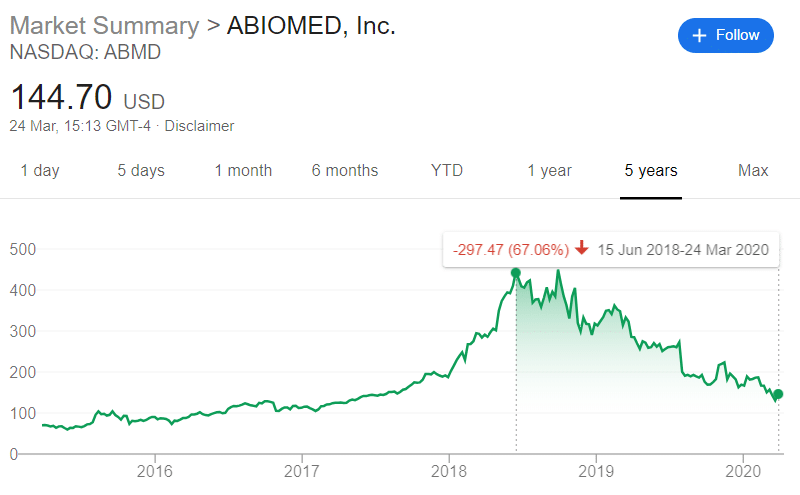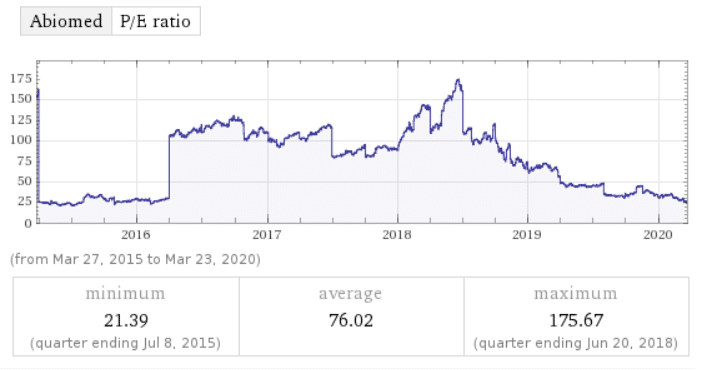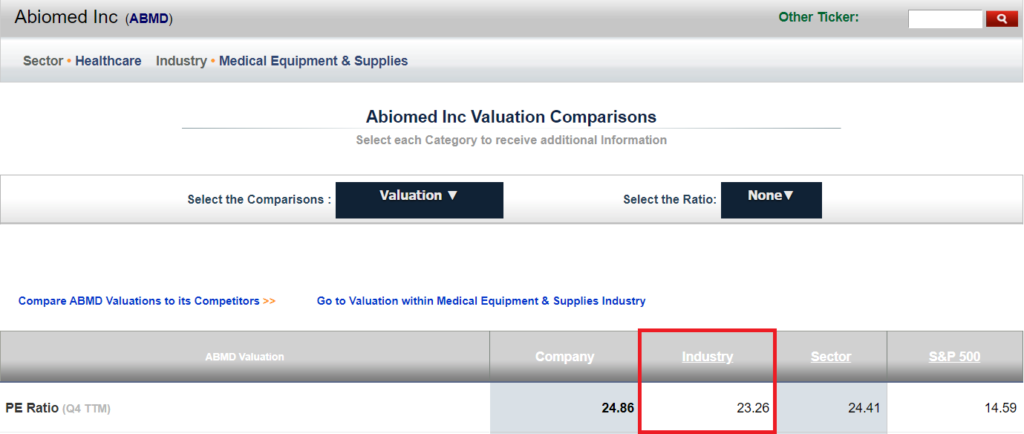It is not uncommon to hear people say this,
"The stock I invested has such strong fundamentals, why did the share price fall by 50% over the past years?

In this article - I am going to share with you the reasons why stock price falls even with strong fundamentals, and more importantly, how you can avoid these situations.
What Is Considered Strong Business
The definition of a strong business may be different for some.
Personally, I used an investment checklist to evaluate the quantitative fundamentals of a business.

Get Your 8-Point Checklist!
So that you know what stocks to avoid investing in.
We can use an investment checklist to quickly filter out whether it is a good company.
...let's dive in straight to an example.
One of the businesses that I was looking to invest in was Abiomed (ABMD) - and it was at its high of $459.75 in 2018.
Today, (at the point of writing), the share price $144.62.

Now, before we go on and discuss why did the share price fall - it is important to provide some context.
In terms of the fundamentals of the business - I personally love it as an investor.
The business has a low debt to equity, great net margin, healthy cash flow, so on and so forth.
In short - it passed my personal investment checklist.
Why Stocks Fall Even With Strong Fundamentals?
Well, the most common reason why stocks fall is because of overvaluation.
Let's discuss ABMD, for example.
One of the simplest ways for valuation is to use the average PE ratio of the business for the past 5 years.
Let's take a look at the PE ratio of ABMD in October 2018 (when the price was at its highest) - it was around 105.
And 105, it's crazy high. Even its average PE ratio for the past 5 years was 76.02
But how do we know if 105 or 76.02 is considered high?
Well, you are exactly right - we don't know. Unless we have some sort of comparison.

One of the ways I figure out if a stock is trading at an unreasonable valuation of PE ratio is by looking at its peers.
To simplify things - we can even look at the PE ratio of the entire industry of Abiomed - Medical Equipment & Supplies.
Well - let's take a look at the PE ratio of the Medical Equipment & Supplies Industry.

Notice that the industry PE ratio is only at 23.26.
So to pay for ABMD at a valuation of 76.02 or even 105 - is clearly overpaying for the business.
Well - now you should understand why stock prices can fall even with strong fundamentals.
Before I go on, I want to clarify this.
A high PE ratio does not necessarily mean it is expensive and a low PE ratio does not mean it is cheap.
The Misconception Of PE Ratios
Every time I see a FB post on "Company XXX is trading at a PE ratio 5, it seems really cheap."
It baffles me.
A company can have a low PE ratio simply because it is a low-quality company (i.e. company without much growth prospect)
The reverse is true as well.
A company with higher growth tend to have a high PE ratio
Many people make the mistake of "I will only invest in companies with PE ratios lesser than 12 - because that means it is cheap".
If you invest in this manner - you will most likely be missing out on growth companies like Facebook, Visa, MasterCard, etc.
So how do I know if a PE ratio is considered "low"
Well, I compare the current PE ratio with the following two, and I will use ABMD as an example:
- The 5 years average PE ratio of the Company - 76.02
- The Industrial PE Ratio of the Company - 23.26
And I will use the lower PE ratio between the two, which in the case, would be 23.26.
So if the current PE ratio of ABMD is lower than 23.26 - then only will I consider it "cheap".
This is the most crucial detail - you never want to overpay for a business.
Most investors have the "fear of missing out" and as such, choose to jump on the bandwagon and invest in an overvalued business.
Should You Jump On The Bandwagon?

You notice that the entire section above - was really on evaluating whether the stock is overvalued.
As value investors, we want to buy quality businesses that are undervalued.
However, at times, people jump on the bandwagon and disregard these value investing principles, because prices were going higher and higher, and they don't want to miss out on those gains.
Look at the chart of Abiomed again - notice that in from 2016 to 2018 - the stock was in a massive bull run of 400+%.
You would have 4X your money.
The PE ratio during those periods was at its 100s - and therefore overvalued, most value investors would have missed these gains.
And that really, in a sense, the drawbacks of value investing.
It's hard to imagine a value investor investing in companies like AMZN or TSLA (companies with very high valuations), which were multi-baggers.
The key idea here is to understand yourself as an investor.
Are you investing as a value investor or the blind man following the crowd?
If you are investing as a value investor - you wouldn't want to invest in an overvalued company, as the prices may eventually fall back to its fair value.
If you are investing as the blind man following the crowd...
My advice is to not to invest - because that is the worst way to invest.
The most basic idea of investing is to generate consistent returns higher than bank interest rates.
If you are always following others, I highly doubt that you are able to generate consistent returns. So don't.
The Bottom Line
If you are reading this as a value investor - I hope you understand the reason why stock prices can fall even if you had invested in a fundamentally strong business.
And if you want to avoid finding yourself in such situations - you need to stick to your value investing principles and never invest in a company overvalued.
Never invest in a company without a fundamental thesis on your own.
Some of the worst reasons to invest includes:
- "Prices were at $120 previously, now it is at $20. If it recovers back to $120, I will make a lot of money."
- "Warren Buffett invested in this company as well - it should do well"
- "Everyone is talking about this stock - I should invest so that I don't miss out"
If you want to become a better investor - you need to start thinking for yourself and making your own decisions grounded on fundamentals.
Remember that where you buy a stock - you are essentially buying a part of a real business.
And you never want to overpay for a business.
